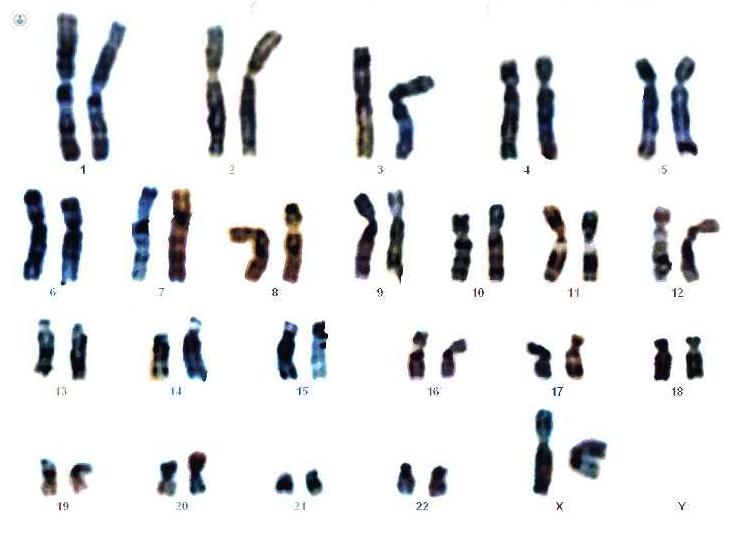Karyotyping
Dr Melita Irving - Clinical genetics
Created on: 10-16-2019
Updated on: 05-04-2023
Edited by: Conor Lynch
What is karyotyping?
Karyotyping is a process used by doctors to examine your set of chromosomes. A karyotype is a photograph of your chromosomes that can be used to assess the chromosomes of an individual and can then be used to check if any abnormalities or structural problems.
If there are, it can indicate a genetic disorder, such as Turner syndrome or Down's syndrome. Sometimes babies are karyotype tested before they are born to check and diagnose potential genetic abnormalities that could cause severe birth defects.

To perform a karyotype test, a sample of cells is needed. These are taken from either bone marrow, placenta, amniotic fluid or the blood.
How is the test performed?
A sample of cells is needed which can come from:
- Bone marrow
- Amniotic fluid
- Placenta
- Blood
There are various methods to obtain a sample, for example, a doctor may use amniocentesis to get a sample if amniotic fluid is needed.
The sample is placed on a medical dish sent to a laboratory. There a technician will stain the cells to make it easier for your doctor to see the chromosomes under a microscope.
What kind of abnormalities is the doctor looking for?
Chromosomes contain genetic material and are in almost every cell in our bodies. They are made up of DNA, passed down from our parents, and determine how we develop. When a cell divides, the chromosomes line up in pairs ready to split in processes called mitosis and meiosis. They then duplicate by splitting into another identical cell.
There are many different types of abnormalities that a doctor will look for. During the examination, a doctor will organise the chromosomes into pairs to easily identify any abnormalities. These include:
- Extra chromosomes
- Missing or broken chromosomes
- Extra portions of chromosomes
- Portions of a chromosome that has broken off and formed onto another
Why is the test done?
Karyotyping can be used to:
- Detect a genetic disorder of an unborn baby
- Detect a genetic disorder in a baby or child
- To detect if an abnormal chromosome is causing infertility or miscarriages in women
- To diagnose genetic disorders that could be passed down to children
What do abnormal test results mean?
If the results are abnormal, it means that the mother or child has more or less than 46 chromosomes or there is an anomaly in the size or form of one or more of them. This can lead to some common syndromes known as:
- Down’s syndrome
- Edward’s syndrome
- Turner syndrome
How do you prepare for the test?
A karyotype test does not usually require any special preparation.
Which type of specialist will carry out the test?
You will want to see a doctor that specialises in genetics, known as a geneticist.
